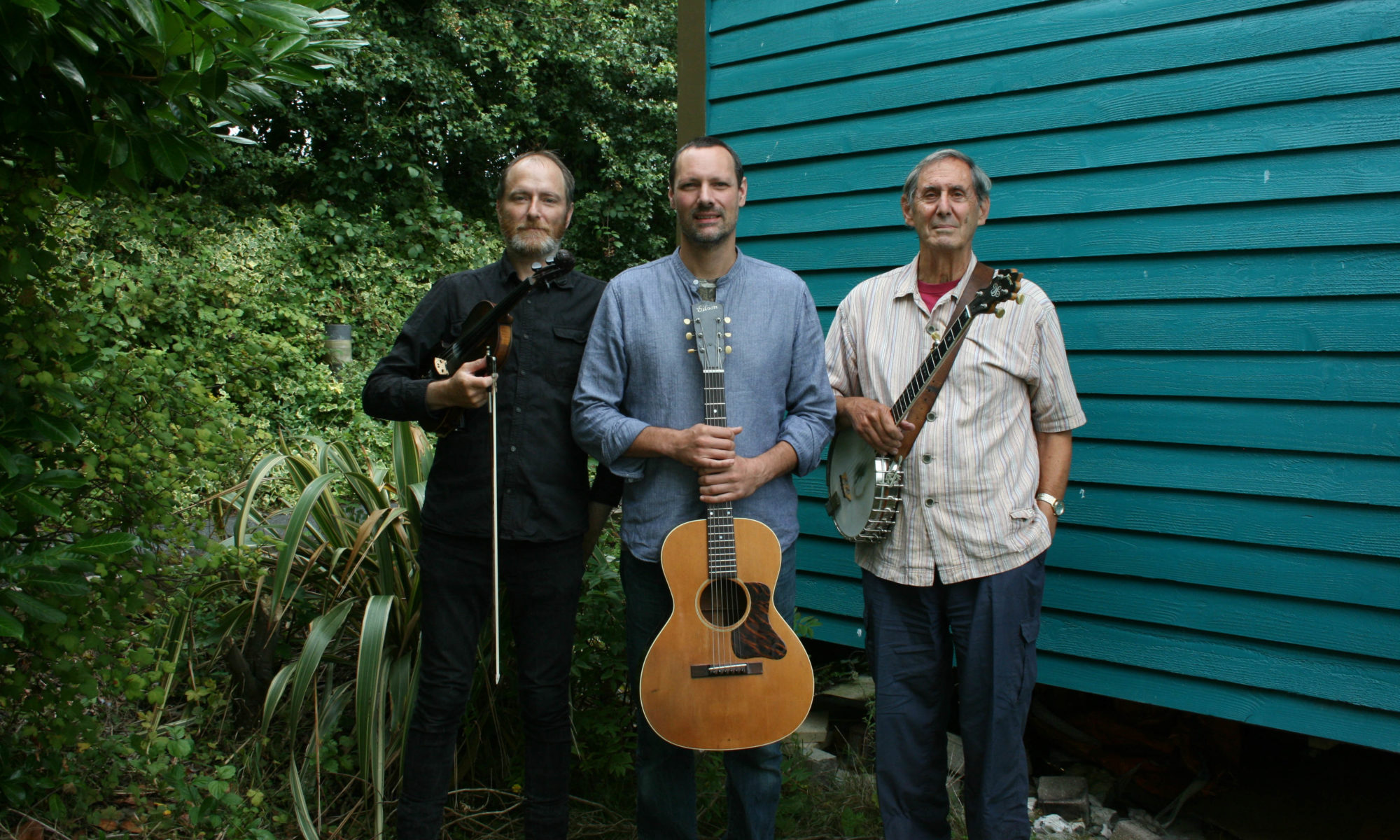In the late 1950s Tom Paley and Joe Locker became casually acquainted in New York City’s Greenwich Village folk scene, centered around the Washington Square Park Sunday sessions. Although Paley was well known in America mainly as a member of the New Lost City Ramblers, an important and seminal folk revival group, Locker’s year of travelling and playing in Europe – mainly England and France – meant that he knew the European folk scene. When Paley planned to travel to Europe, Locker was able to provide him with ideas and contacts, and they agreed they might eventually meet up after Locker’s US Army hitch. This they did in early 1966, by which time both had decided to settle in London. They first played as a duo combining Paley’s strength in traditional styles with Locker’s somewhat more modern approach. Some months later they were joined by versatile Scots fiddler Bobby Campbell to form the New Deal String Band, a name chosen to reflect the period which yielded much of the repertoire and style, as well as the trio’s broadly left-of-center views and admiration of Franklin D. Roosevelt.
Campbell left the group the following year, and was replaced by Janet Kerr, a young fiddle player from Essex with a vast knowledge of American traditional folk music. This Mark II version of the band had some major successes over the next few years, including multiple appearances at the Cambridge Folk Festival, BBC radio shows, the Keele Folk Festival, numerous folk clubs and concerts, and their Down In The Willow LP for Argo Records. Paley’s guitar styles were featured on the first show of John Pearse‘s ITV series Music Room, and the final one focussed on Locker’s banjo picking. They also travelled to Holland to perform as the main guests on Pearse’s initial tv show there. Janet Kerr became well known for her Appalachian field recordings on Leader Records LPs, most notably involving descendants of Charlie Poole & The North Carolina Ramblers.
Various personal commitments and activities necessitated a short break before the band restarted in late 1972 , when Robin Arzonie, a fine fiddler and guitarist from Brighton replaced Janet Kerr. Arzonie had deputised for Janet Kerr on a Music Room tv show, and had often played with Paley and Locker at sessions and clubs. In addition to club and radio work (which included an all-night phone-request show on LBC) the band played at various festivals in Sweden and Denmark. Eventually by the late 1970s, again due to personal commitments and other musical activities, this Mark III version dispersed.
In the mid-1990’s, Paley encouraged Locker to start playing seriously again after a long layoff, thinking that a revised NDSB would work well now that his son Ben Paley had become such an excellent fiddler. They set about practising together, and after some effort on Locker’s part to regain his “chops” the result began to gel. Tom Paley’s dry wit was evident during an early practise session when, attempting one of their best recorded duets The Tennessee Gravy Train, Locker was struggling with the tempo. His wife went out shopping, and after a while he put on the record to hear the original speed. At that point she returned, and called upstairs “Hey you guys have done some really good practising – sounds great”. Paleys response: “It’s not us, it’s two other guys”. With Ben’s terrific fiddle playing (as a lad in North Carolina he had learned from bluegrass fiddle great Jim Buchanan) the band took off again: repeated top slots at major UK and Scandinavian festivals, a critically acclaimed Wildwood CD Dealing A New Hand, six consecutive annual lunchtime lobby concerts at the Royal Festival Hall, and a month-long tour of the American mid-West from St. Louis north to St. Paul including clubs, concerts, schools, festivals, and radio. They had to forego an invitation to play on Garrison Keillor‘s popular nation-wide radio show Prairie Home Companion because the first available date was some weeks after their last USA gig.
Another highlight was their participation at Belgium’s National Music Museum in a “banjo week” with concerts and workshops. While all three NDSB Mark IV men were involved in other musical activities, they continued working together until late 2016 when the elder Paley’s health began to fail. Although Tom continued to attend jam sessions regularly, he passed away in late 2017, just over fifty years after the band’s formation. A vastly attended memorial celebration took place at Cecil Sharp House in London — see here for a brief survey of the memorial.
Ben Paley and Joe Locker decided to keep the Band going, and so jack-of and master-of all folk music trades Robin Gillan was asked to join. The versatile Gillan had played with all NDSB members for many years, including with Ben Paley on the Tom Paley’s Old Time Moonshine Revue CD and tour, with Locker on Kate Lissauer‘s fine Ain’t No Grave CD, and at many sessions and informal gatherings. It is this Mark V NDSB now performing, featuring especially the wonderful twin fiddling of Ben and Robin, plus some new tunes and songs in the latter’s repertoire.
One of the main virtues of the band, which has made them popular with audiences and other musicians, has been their accessibility at concerts, workshops, and sessions – “They play airs, but they don’t put on airs”.
